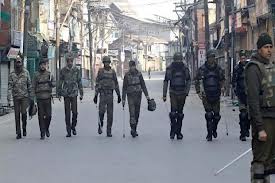"Curfew remains in force in eight police station areas of Srinagar city and Sopore (Baramulla district), Trehgam (Kupwara district) and Kulgam towns," a police spokesman said. 
He said the police station areas where curfew is in force in the city are Rainawari, Maharajgunj, Safakadal, Khanyar, Nowhatta, Zadibal, Kralkhud and Maisuma.
Curfew was clamped in these areas on Tuesday night following widespread protests over the killing of a youth reportedly in Army firing at Baramulla during protests against alleged highhandedness of soldiers.
Army has claimed that its personnel were surrounded by a mob of around 200 persons and the situation had turned life threatening for the soldiers.
It also claimed that the soldiers had fired warning shots in the air and could not have caused death.
The Army, while ordering an internal inquiry, also sought a detailed probe by police into the incident to find out the truth.
Police and paramilitary personnel have been deployed in large numbers in vulnerable areas of the city and other parts of the valley to maintain law and order.
Although there was no call for shutdown by the separatist groups, a spontaneous shutdown was observed in areas where curfew has not been imposed.
Shops and business establishments remained closed while public transport remained off the roads.
Over 20 persons were injured in the clashes between protestors and law enforcing agencies in the city and other parts of the valley since Tuesday evening.
Meanwhile, Kashmir University has postponed all examinations scheduled for Thursday and Friday in view of the prevailing situation in the valley. A spokesman of the university said fresh dates for the examinations will be notified later.





Comments
Add new comment